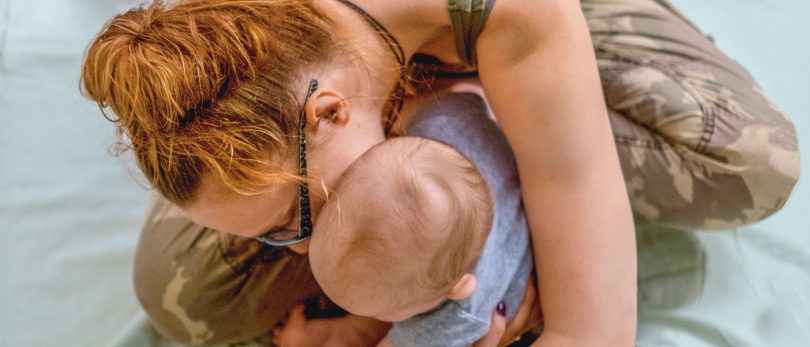The opioid crisis affects people in all stages of life, but there are few programs that address the unique needs of pregnant women. That was the experience of “Daisy,” a woman in her 20s whose name has been changed in this article for privacy. When she lost her spot in an opioid treatment program that couldn’t support pregnant clients, she didn’t know where to turn.
Web Exclusive
All Are Welcome!
How UHS Wilson Medical Center’s Perinatal Center supports mothers in recovery
Fortunately, she found help from two caring sources, a probation officer who pushed her in the right direction, and UHS’ comprehensive pregnancy program for women addicted to opioids. The probation officer narrowed Daisy’s choices to two: Either he would send her to jail for the duration of her pregnancy, or she could go for an assessment at UHS. Either way, she and her baby would be protected from the effects of ongoing heroin use. She says the UHS program was a lifesaver.
“It’s hard to admit you are pregnant and using to yourself, let alone to other people,” says Daisy, who has been battling addiction for eight years. “But once you do that, there is help if you want it. You have to be ready and open to it.”
How UHS helps
UHS has always welcomed pregnant women into its medication assisted treatment (MAT) program for opioid use disorder at New Horizons Alcohol & Chemical Dependency Treatment Center in Binghamton. But in 2016, a specialized program for moms-to-be was born. It provides inpatient and outpatient care and education for women throughout pregnancy and delivery, and after birth. A medical and psychosocial counseling team works with community agencies to help participants recover and remain abstinent, while keeping babies healthy and families together. It is the only program of its kind in the region.
Wraparound services
UHS’s New Horizons addiction treatment program for pregnant women includes:
Intensive inpatient care: Combines medication assisted treatment, maternity care, perinatal care and individual and group counseling.
Supervised medication assisted treatment: Outpatient treatment that also includes individual and group counseling.
Group therapy: Women share experiences and make supportive connections in therapy with their peers.
Baby care education: Women learn about having a healthy pregnancy and parenting, and practice hands-on childcare skills during weekly sessions.
Connection to vital community services: Participants learn about local programs for assistance with childcare, contraception, healthy relationships and more. Resources for fathers are discussed as well.
Incentive program: Grant funding allows UHS to reward participants points for attending OB appointments and having negative urine drug screens. Points can be redeemed for baby items, thereby encouraging engagement in care.
“Only about 15 percent of programs that treat substance abuse disorders are equipped to care for pregnant women, so we are filling an unmet need,” says Julia Hunter, MD, assistant medical director of UHS Addiction Medicine, who heads the pregnancy program. “Our program is successful because barriers to long-term recovery are addressed, such as safe housing, childcare, employment and parenting skills. The program provides support while they do the hard work of recovery.”
Treatment in pregnancy
UHS uses MAT for opioid addiction based on evidence that, for the majority of people, it is the most effective path to long-term recovery, Dr. Hunter says. In MAT, patients are given doses of either buprenorphine/naloxone or methadone. “We’ve found that MAT, combined with maternity care, counseling and psychosocial support, reduces the risk of relapse significantly and greatly improves outcomes for the mother-baby dyad,” Dr. Hunter explains.
Daisy says the education and medical care she received reassured her that her baby would be safe.
“I felt comfortable enough with what I learned to explain my treatment to concerned family members,” she says. “The inpatient program monitored my medication, made sure my dosage was right, and there were no negative effects on me or my baby. They also took me to all of my appointments— my OB/GYN care, my lab tests and my counseling sessions. There is a lot of hard work in treatment, and when you know your baby is thriving, you can thrive yourself.”
“I want people to know that being on MAT is a positive in the long run,” adds Daisy. “You’ve got to put your ego aside, and know what’s best for mom is what’s best for baby. In this program, I had full support.”
No stigma
Daisy started the program in inpatient care and graduated to outpatient treatment in about four weeks, with intensive counseling throughout. She looked forward to weekly baby care and parenting classes with her peers. The connections she made with women in the treatment group are now just a phone call away, she says. The program’s non-judgmental atmosphere extended all the way to the delivery room, and helped her stay engaged and strong.
“In the program, I didn’t once have anybody in the medical or counseling field judge my choices,” she says.
“They don’t make you stay on the program—it’s our own choice to do that. But they reassure you that in due time you will recover and your baby will be safe. It was helpful to have the doctors, nurses and counselors all working for the same goal.”
“We have tremendous support from the New Horizons team and the perinatal and NICU staff at Wilson,” says Lena LaDue, LMSW, CASAC, a UHS addiction specialist who works closely with the pregnant patients. “When we started the program, we found that these women were desperate for help but didn’t feel safe enough to ask for it. We opened our doors, and they found safety.”
Daisy’s baby was born healthy and without neonatal abstinence syndrome at UHS Wilson Medical Center. Daisy, who also has a preteen child, is now home, caring for her two children. She plans to attend a continuing program for graduates of New Horizons outpatient care. “It’s a great program,” she says. “They gave me the tools to make my own decisions. When you are doing the right thing, there are people who support and go to bat for you. Sometimes when you don’t believe in yourself, you need people to believe in you.”
WE CAN HELP
Our doors are open to pregnant women seeking treatment for opioid addiction and other substance use disorders. Call 762-2800 to schedule an appointment for an evaluation and program recommendations.







